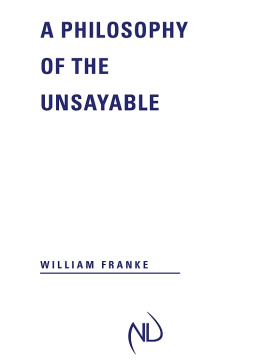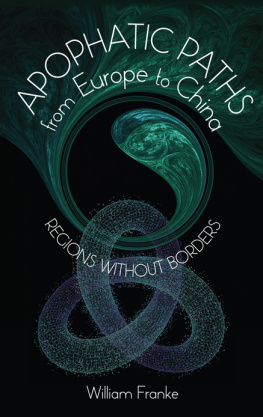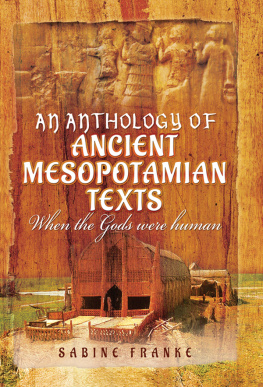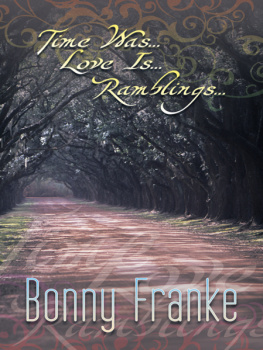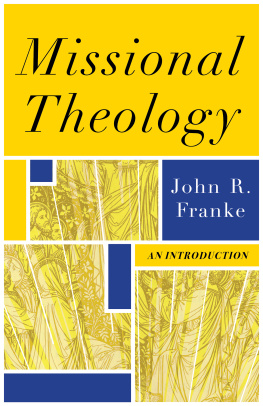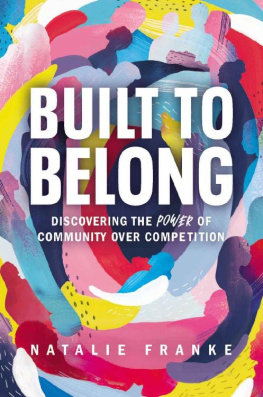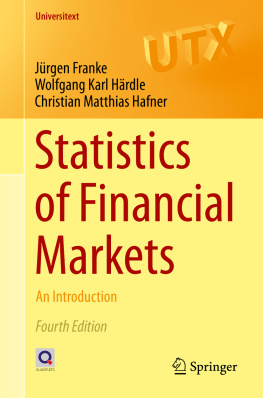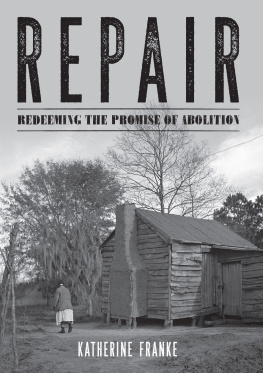Franke - A Philosophy of the Unsayable
Here you can read online Franke - A Philosophy of the Unsayable full text of the book (entire story) in english for free. Download pdf and epub, get meaning, cover and reviews about this ebook. City: Notre Dame;Indiana, year: 2014, publisher: University of Notre Dame Press, genre: Religion. Description of the work, (preface) as well as reviews are available. Best literature library LitArk.com created for fans of good reading and offers a wide selection of genres:
Romance novel
Science fiction
Adventure
Detective
Science
History
Home and family
Prose
Art
Politics
Computer
Non-fiction
Religion
Business
Children
Humor
Choose a favorite category and find really read worthwhile books. Enjoy immersion in the world of imagination, feel the emotions of the characters or learn something new for yourself, make an fascinating discovery.
A Philosophy of the Unsayable: summary, description and annotation
We offer to read an annotation, description, summary or preface (depends on what the author of the book "A Philosophy of the Unsayable" wrote himself). If you haven't found the necessary information about the book — write in the comments, we will try to find it.
Franke: author's other books
Who wrote A Philosophy of the Unsayable? Find out the surname, the name of the author of the book and a list of all author's works by series.
A Philosophy of the Unsayable — read online for free the complete book (whole text) full work
Below is the text of the book, divided by pages. System saving the place of the last page read, allows you to conveniently read the book "A Philosophy of the Unsayable" online for free, without having to search again every time where you left off. Put a bookmark, and you can go to the page where you finished reading at any time.
Font size:
Interval:
Bookmark:
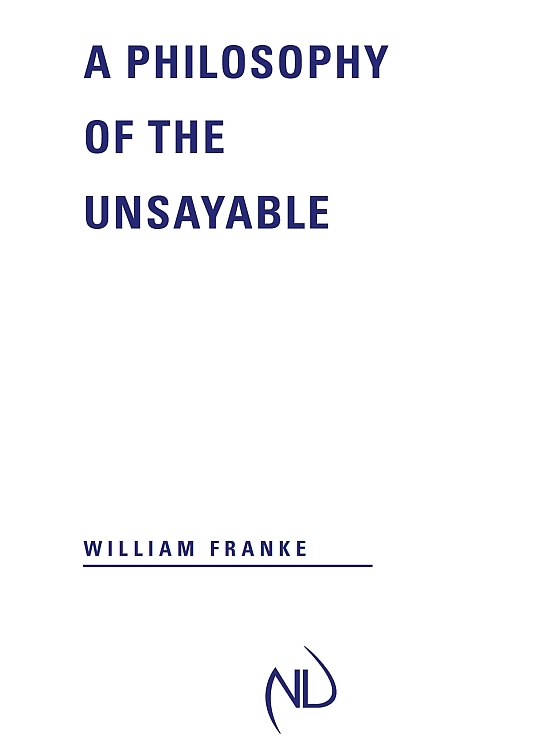
A PHILOSOPHY OF THE UNSAYABLE
WILLIAM FRANKE
University of Notre Dame Press
Notre Dame, Indiana
Copyright 2014 by University of Notre Dame
Notre Dame, Indiana 46556
All Rights Reserved
E-ISBN 978-0-268-07977-2
This e-Book was converted from the original source file by a third-party vendor. Readers who notice any formatting, textual, or readability issues are encouraged to contact the publisher at
For Maddalena Cerqui
Oltre la spera che pi larga gira...
CONTENTS
The present volume sketches a distinctive philosophical outlook that emerges irrepressibly from the predicament of philosophy today. It interprets what are widespread intimations of thinking in the current milieu of critical reflection across disciplines in the arts and sciences and beyond into technical and professional fields and culture generally. We are in an age in which discourse becomes acutely conscious of its intrinsic limits and is dominated by what it cannot say. Especially the last two and a half centuries have abounded in new and radical currents of thinking about the limits of language and what may or may not lie beyond them. The pace of such thinking seems to have greatly accelerated in the initial decades of the twenty-first century. This thinking is rooted, however, in millenary discourses of mysticism and negative theology that can be traced back to the origins of the Western intellectual tradition. A kind of perennial counter-philosophy to the philosophy of Logos has resisted its claims throughout the history of Western thought.
There is, in fact, an amorphous but immense sea of discourse concerned with the ways that discourse has of doubting and denying itself. This type of reflection arises when language runs up against the limits of what it is able to say. Certain discourses concentrate on these limits and on how language necessarily speaks from and out of them. This generates counter-discourses to every powerful explanatory paradigm that makes positive claims to comprehend reality, to say what really is. The counter-discourses typically emphasize that what is not and even cannot be said is actually the basis for all that is said. They shift attention away from what discourse is saying to what it is not saying and cannot sayeven though this involves, paradoxically, an even more intense focus precisely on language, on its limited capabilities, its borders, its beyond.
These counter-discourses can even take a more aggressive stance. They can position themselves not only at the limits and margins of normative discourse but as infiltrating it through and through. All discourse in this perspective, which I call apophatic, shows up as necessarily preceded by and predicated on what cannot be said. This entails a claim to a yet more powerful comprehensiveness, though one at first purely negative in nature, evoking a power beyond discourse, a potential that words release but cannot master. Metaphysics, monotheisms, and mysticisms, as well as philosophies of existence and poetics of revelation, can be understood in their deeper, driving motivations only from this perspective, which nevertheless all too easily slips from view because it eludes logical articulation and defies discursive expression.
Ineffability was once a leading theme of the Neoplatonists (particularly Plotinus, Porphyry, Proclus, Iamblichus, and Damascius) and of their heirs in the monotheistic traditions of Christian mysticism (Dionysius the Areopagite, John Scotus Eriugena), of the Kabbalah, of Sufism, and again of certain post-Scholastics (Meister Eckhart, Nicholas Cusanus). Baroque mystics such as John of the Cross, Jakob Bhme, and Silesius Angelus share this same obsession with Romantic thinkers like Kierkegaard and the late Schelling, as well as with imaginative writers such as Hlderlin, Emily Dickinson, Rilke, and Kafka. The expressiveness of silence, the void, nothingness has been explored equally in modern music (Schoenberg, Cage), in painting (Malevich, Kandinsky), and in architecture (Le Corbusier, Mies van der Rohe, Daniel Libeskind) in tandem with the apophatic philosophical reflections of Wittgenstein, Heidegger, and Franz Rosenzweig. These major monuments of modern apophatic culture were announced by apocalyptic prophecies of the collapse of language and civilization altogether, emblematically around the fin de sicle in the Vienna of Hugo von Hofmannsthal, Gustav Klimt, Karl Kraus, and Freud.
Similar accents and thematics were hauntingly echoed, furthermore, in assimilating the Holocaust and its aftermath, by philosophical critics such as Walter Benjamin and Theodor Adorno, as well as by poets like Paul Celan and Edmond Jabs. And the unsayable has again become the keynote of innumerable expressions of contemporary culture. These range from the widely diffused use of deconstructive critiqueinspired especially by Jacques Derrida, Emmanuel Levinas, and Maurice Blanchotin all sorts of theoretical discourses to the clamor of silence heard so frequently in fiction and poetry, influentially in the writings of Louis-Ren Des Forts or Samuel Beckett or Yukio Mishima.
These references are obviously far-flung and move across widely disparate spheres of culture. Still, in every case, they flag an attitude toward words that is at once skeptical and fideisticunconvinced by the pretended adequacy of words, yet acutely attuned to what they must miss grasping and passionately open to what they cannot say. The unsayable is what repels language, yet it requires language of some kind in order to be descried, so as to register at all. Such discourse or counter-discourse, moreover, traverses a whole spectrum of different disciplines and can be surprised in the most diverse sorts of guises. However, these various manifestations of unsayability all pivot on the fact that discourse has a self-reflexive, self-critical ability to call itself into question and to withdraw, leaving what it cannot say in its wake. This trajectory, which is produced by the movement of thought and speech vis--vis what it cannot comprehend and therefore recoils from, constitutes the trace of the unsayable. The unsayable cannot be made manifest at all, except in terms of this trace that it leaves in the speech that fails to say it.
As is inevitably the case with whatever philosophy, the significance and force of what it says depends to a high degree on how it refracts other philosophieson how it funnels currents familiar from elsewhere, whether historical or contemporaneous ways of thinking, into forms of presentation that are efficacious and revealing. Hence these widespread allusions to what can be conceived of as a loosely coherent tradition of discourse about (or from or out of) what cannot be said. This perennial philosophy of the unsayable, moreover, has close affinities with literatureindeed, it is a philosophy in which philosophical and literary thinking coalesce inextricably.
Accordingly, this philosophical vision hinging on unsayability can be illuminatedand is best complementedby literary-critical and theoretical reflection. Such reflection is proposed here in the form of an interpretive essay (chapter 3) that places in parallel two provocative contemporary poets as writers of the unsayable. Together they display how what can be learned especially from ancient and medieval rhetorics of silence translates into the currency of a contemporary language or anti-language of unsaying. The other main literary-critical excursus (chapter 1) is offered by way of introduction or invitation to the leading philosophical meditation on unsayability in my second essay (chapter 2).
While I refer to my chapters as essays, this book is not a congeries of separate compositions. The essays interlock and fit together in an architectonic that adumbrates (were it only possible) a critique of apophatic reason. More exactly, philosophical critique, as the rational examination of first principles, is overtaken and transforms itself into a literary hermeneutics or poetics and into religious reflection. The first I understand as elucidation of certain rhetorical conditions, such as figuration and narration, that make meaningful discourse possible, while the secondthe tying-back reflections of re-ligionI understand as cultivated awareness of relation to an infinite, never exhaustively specifiable context of relations. Poetic and religious theory are thus deployed critically to illuminate the conditions of possibility of meaningand therewith also of beingin the unsayable.
Next pageFont size:
Interval:
Bookmark:
Similar books «A Philosophy of the Unsayable»
Look at similar books to A Philosophy of the Unsayable. We have selected literature similar in name and meaning in the hope of providing readers with more options to find new, interesting, not yet read works.
Discussion, reviews of the book A Philosophy of the Unsayable and just readers' own opinions. Leave your comments, write what you think about the work, its meaning or the main characters. Specify what exactly you liked and what you didn't like, and why you think so.

